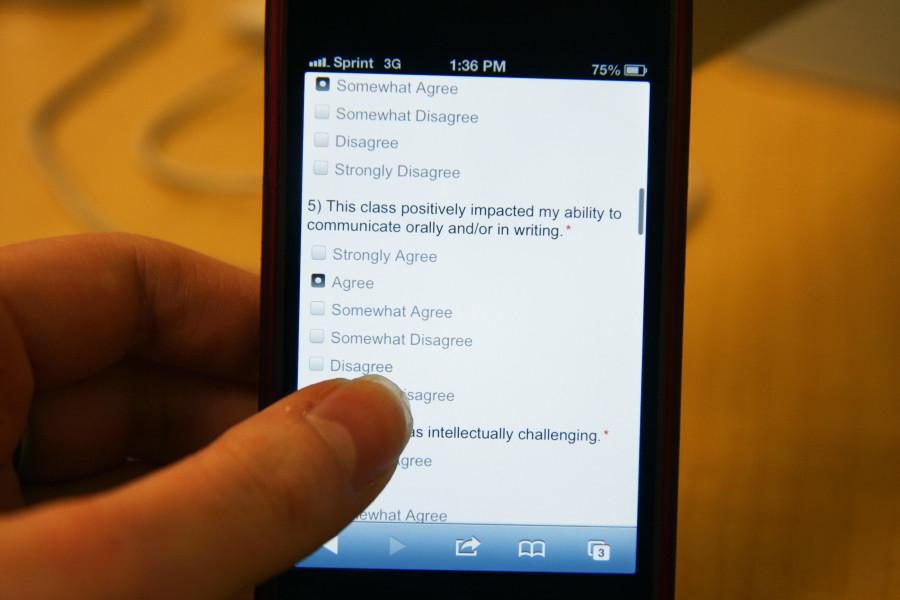As the semester nears its end, the time has come for students to receive emails asking them to fill out course evaluations. Some professors will take time to pause in class to ask students to complete the evaluations, and some will leave the classroom while students complete them. Other professors will not address it.
The emails inform students of a chance to win a $50 Amazon night card for filling out evaluations.
After this upcoming Sunday, the student body won’t hear about evaluations until late April of next semester.
Marquette University’s course evaluation policy states that Course summary reports and student comments for each course evaluated will be available to faculty shortly after the class ends. Each college within the university handles the evaluation process a little differently, with varying degrees of how it affects future classes.
William Cullinan, dean of the College of Health Sciences, said the college takes teaching seriously and that student feedback is vital.
“In the past, I have witnessed entire course re-designs based on student evaluations and have seen departments reassign certain courses to faculty better suited to teach specific content or courses in others,” Cullinan said. “Our only frustration is that sometimes there is a relatively meager response rate among students.”
Cullinan said filling out the evaluation is the best thing students can do to ensure high quality experiences for those students who follow them.
Brian Till, dean of the College of Business Administration, said he does not personally look at the evaluations unless he feels there is reason he needs to look at some.
Till said the evaluations absolutely, at times, impact the re-design of a course.
“They do influence who teaches the course,” Till said. “If a particular faculty member consistently struggles with a particular course, we do make reassignments.”
Till added that the course evaluations also play a significant role in merit raise determinations and faculty promotions.
“I tell my students that evaluations are an important part of being a student,” Sebastian Luft, a professor in the philosophy department, said.
Luft said the questions are very general and should be more specific, specifically the questions where students are asked to rank aspects of the course.
“Also, the form itself is at least a decade old,” Luft said. “That’s time for an update, no matter how it’s worked in the past.”
According to Marquette’s course evaluation policy, the evaluations consist of 15 closed-ended items and two open-ended student comment questions. The closed-ended items consist of four items specifically used for faculty evaluation since spring 2005 and 11 additional items designed to provide the instructor with useful formative data that can be used to improve student learning.
Richard Friman, a professor in the political science department, said he finds the open comments sections most useful.
“The results can help in contributing to a sense of what may or may not be working as intended and what is being perceived by the students,” Friman said.
Friman said the rate of student response among groups can skew the takeaways from the evaluations.
“Student participation is typically uneven. Students with strong feelings of like or dislike for the course or the instructor may be likely to respond in the evaluations,” Friman said.
As reported by the Marquette Wire in 2011, in an effort by the university to increase student participation, Marquette made evaluation completion possible on mobile phones and started to offer potential prizes for completion.
Richard Holz, dean of the College of Arts & Sciences, said the college’s associate dean for faculty James South reviews course evaluations. Holz said he then looks at the evaluations, in consultation with South, that were deemed problematic.
Luft said the head of his department and the dean of the college set up meetings to individually address instructors in the case of severe problems.
Holz said evaluation results are used by faulty to both design new and re-design current courses.
“We are always striving to provide the best courses for our students, and evaluations are one very important method that we use to improve how course material is delivered,” Holz said.
Kristina Ropella, dean of the College of Engineering, echoed that her associate dean for academic affairs and department chairs, as well as herself, review course evaluations after the end of the semester.
“We use the review to learn about student experience in the classroom and labs,” Ropella said. “Students will often comment on instructor preparation for class, instructor organization and communication, approachability and availability of instructor, usefulness of textbooks, usefulness of homework projects and lab experiences, timeliness of faculty assessment of student work, course content relative to real-world experience with co-ops (or) internships and other aspects of student learning.”


